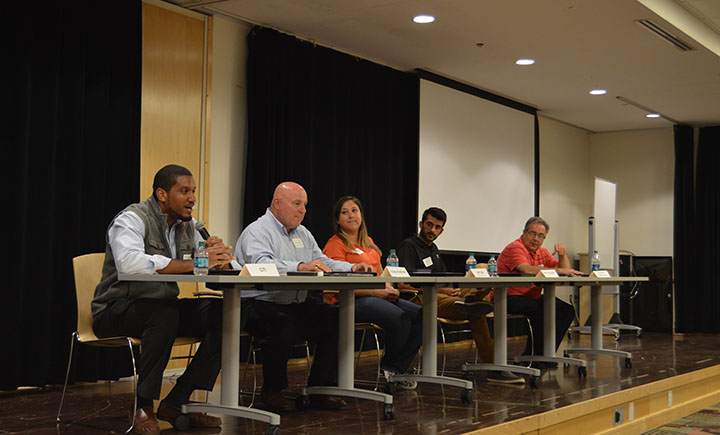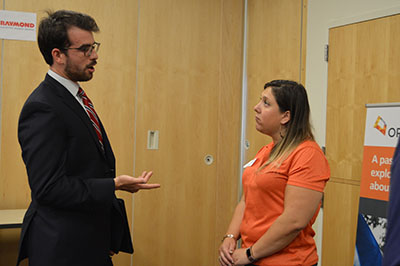The future of STEM careers
What top employers are telling Binghamton University students about outsourcing, restructuring and networking.

Grab a suit, print out your résumé and practice those handshakes. The third week of September was career week and Binghamton University students had their days packed with employer panels, training sessions and a huge job fair.
More than 150 students from the Thomas J. Watson School of Engineering and Applied Science attended the Career Secrets panel led by a group that included an alumnus, recruiters and employees from companies like Citi, Procter & Gamble and The Raymond Corporation. Their panel included a plethora of interview tips and tricks along with a serious look at the challenges currently facing the STEM industries.
Expect change
Companies change. They can be bought out, restructured or downsized and panelists explained that the STEM fields in particular change frequently. That’s why Mike Hills, a senior manager from GlobalFoundries, told students to “maintain full employability.” That could mean anything from frequently brushing up your résumé, a service the Watson Career and Alumni Connections office offers to all Watson School students and alumni, or maintaining your basic communication skills. Hills encouraged students to expect that any STEM career will come with company changes and that means always being open to moving somewhere new or starting over in a new position or department.
Lisa Minieri, a college recruiter with Optum, emphasized that careers don’t always turn out how you expect in college. “I was an English major and tried to find a career in publishing,” she said. “I took a corporate job just to get my foot in the door and then I just fell into recruiting. Now I have a job that I love. Apply to positions even if you don’t have all of the minimum qualifications, because you never know where it could lead.”
Know thyself
The ancient Greek aphorism still holds true for today’s job seekers. HR recruiter from The Raymond Corporation Gene George wants any prospective employee to answer three questions: “Who, what and why. Who you are, what you do and why we should hire you.” Hills added one more question to that list: “How are you going to make a difference in any opportunity that you have?”
Whether it’s at a job fair or in an interview, being able to express who you are was important to all the employers present. Alumnus Christopher Lemione ’10 works for Citi and said that he’s looking for someone who is genuine. “The best way to make a lasting impression is to come off in a genuine matter. Genuinely convey what your core values are and what you represent.”
Finding a job is great, but finding one that truly fits is better. Waqas Tanweer is a recent graduate from Stony Brook University and a line manager at Procter & Gamble. He explained, “Know what they’re offering and what you’re looking for. At the end of the day, it has to be a match. It won’t work out unless both sides are happy.”
Know the company
All the panelists agreed; in 2017, there’s no excuse for not knowing at least the basic information about a company. “With the internet, you have so much at your fingertips now as far as research goes,” said George. “It’s just a perfect time to be looking for a job. You can do so much in a very short amount of time.”
That research doesn’t need to take hours out of your day. As George said, it could be done while you’re waiting at a job fair. “You all have cell phones. While you’re waiting to speak to an employer at one of these job fairs, look up the company and learn something about it.”
If you’re looking to make an impression, sharing a tidbit of information about the company can spark some positive thoughts in the mind of the recruiter. For Hills, it makes him think “this person actually cared enough to look up what we are doing at this company.”
Not only will knowing the company give job seekers a leg up, it could also help them understand what the company really needs. One student asked a difficult question at the end of the panel. He said, “With the increase in outsourcing within the STEM industry, do you believe the future of your companies is still in America?” Tanweer explained, “If we need someone to code all day long, we can find someone to do that cheaper overseas. What we really need are people who are problem solvers. They should know how to code, but also how to communicate. There’s always going to be a high demand for those people.”
Keep networking
Classic networking skills never go out of style. Part of maintaining full employability means never forgetting the lessons learned while a student from places like the Watson Career and Alumni Connections office. Hills encouraged students to “Always be up! Even just the basic things like eye contact and shaking hands.”
Keep in mind your audience, too. Not every recruiter wants to hear all the specific details of your research. “I have had a lot of well-meaning students come up to me and try to recite their senior project,” said George. “I’m not an engineer. My eyes will just glaze over. You’ve got to really sell yourself.”
Networking is also one of those skills you shouldn’t lose as you get further into your career. Hills graduated over 30 years ago and still said, “I used my network to wind up where I am.”
While the tried and true techniques haven’t changed, STEM job seekers should expect to go into any position open to the possibility of change and ready to adapt along with the industry. After the panel, it’s clear that the people who are problem solvers will always have a place, as long as they can continue to provide a step beyond the basic skills.


